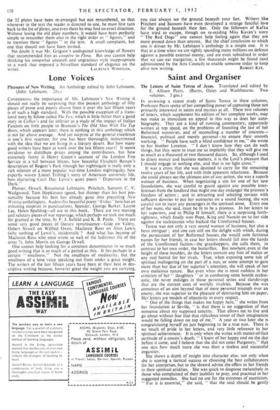Lone Voices
Pleasures of New Writing. An Anthology edited by John Lehmann. (John Lehmann. 21s.)
CONSIDERING the importance of Mr. Lehmann's New Writing it should not really be surprising that this present anthology of fifty pieces of prose and poetry drawn from it over the last fifteen years is of such a high standard. With the possible exception of a trans- lated story by Silone called The Fox, which is little better than a good story in Collier's and far inferior as a study of the impact of Italian Fascism on little people to Brancati's The Old Man With The Top Boots, which appears later, there is nothing in this anthology which is not far above average. And yet surprise at the general excellence is one's first reaction, for one has been thoroughly indoctrinated with the idea that we are living in a literary desert. But how many good writers have been at work over the last fifteen years! It seems invidious to distribute prizes among the contributors, but how
• extremely funny is Henry Green's account of the London Fire Service in a lull between blitzes, how beautiful Elizabeth Bowen's description of Regent's Park (though her nightingale is really only a rich relation of a more popular war-time London nightingale), how expertly woven Lionel Trilling's story of American university life, how shattering Cecil Day Lewis's quiet poem " Departure in the Dark."
Plomer, Orwell, Rosamond Lehmann, Pritchett, Sansom, C. V. Wedgwood, Tom Hopkinson (good, but thinner than his best pre- sumably because his best has already gone into preceding -New Writing anthologies), Auden (his beautiful poem "Exiles" here has an irritating misprint in punctuation), Spender, George Barker, Laurie Lee, Helen Spalding—all are in this book. There are two moving and salutary pieces of war reportage, which perhaps we took too much for granted at the time, by F. J. Salfeld and K. B. Poole. There are some very good pieces of literary reminiscence—Gide on Valery, Osbert Sitwell on Wilfred Owen, Maclaren Ross on Alun Lewis (why nothing of Lewis's, incidentally ? And what has become of Maclaren Ross who once wrote so well of the ludicrous life of the army ?), John Morris on George Orwell.
One cannot help looking for a common denominator in so much good writing that is so much of a period as this. It lies perhaps in a certain " smallness." Not the smallness of mediocrity, but the smallness of a lone voice speaking out from under a great weight. The writers of the last fifteen years have been at their best in des- criptive writing because, however great the weight you are carrying, you can always see the ground beneath your feet. Writers like Pritchett and Sansom have even developed a strange fanciful love for the ground beneath their feet. Only the followers of Kafka have tried to escape, though on re-reading Miss Kavan's story "The Red Dogs" one cannot help feeling again that they are more pinned down than anyone. But the chief conclusion to which one is driven by Mr. Lehmann's anthology is a simple one. It is that at a time when we are rightly spending many millions on defence against a possible external enemy, and are even subsidised in order that we can cat margarine, a few thousands might be found (and administered by the Arts Council) to enable someone today to keep


































 Previous page
Previous page